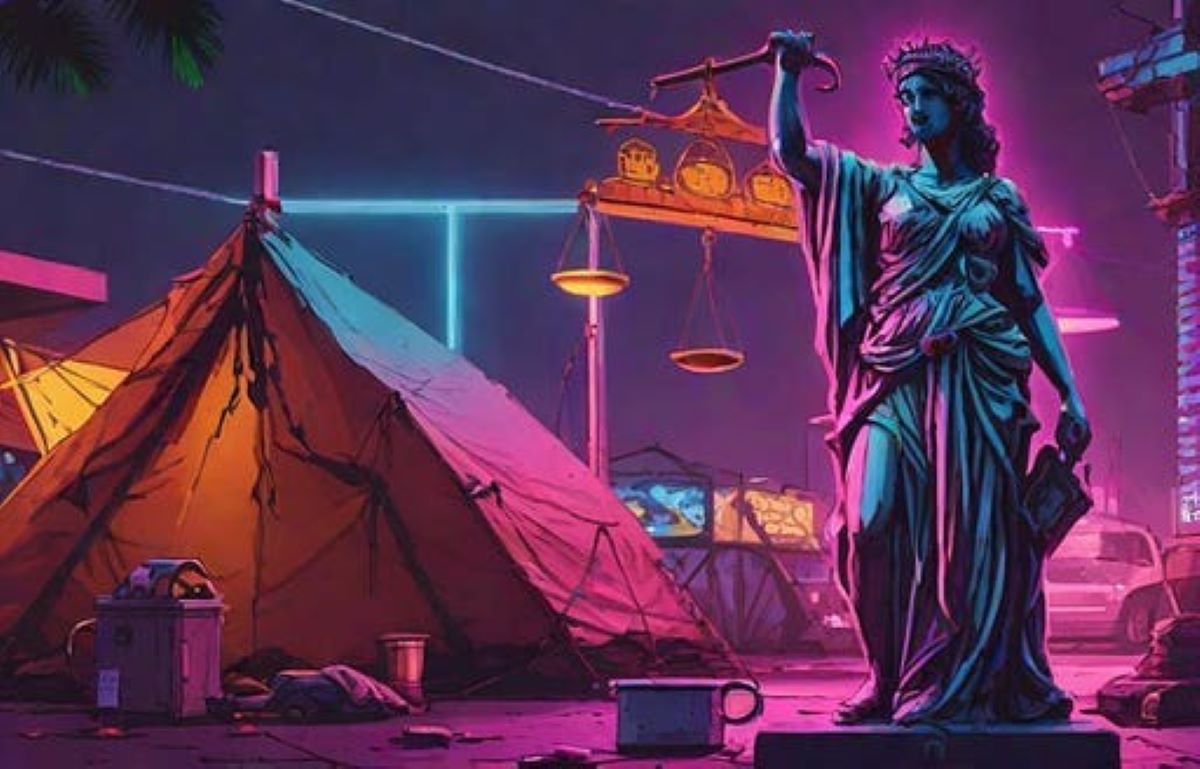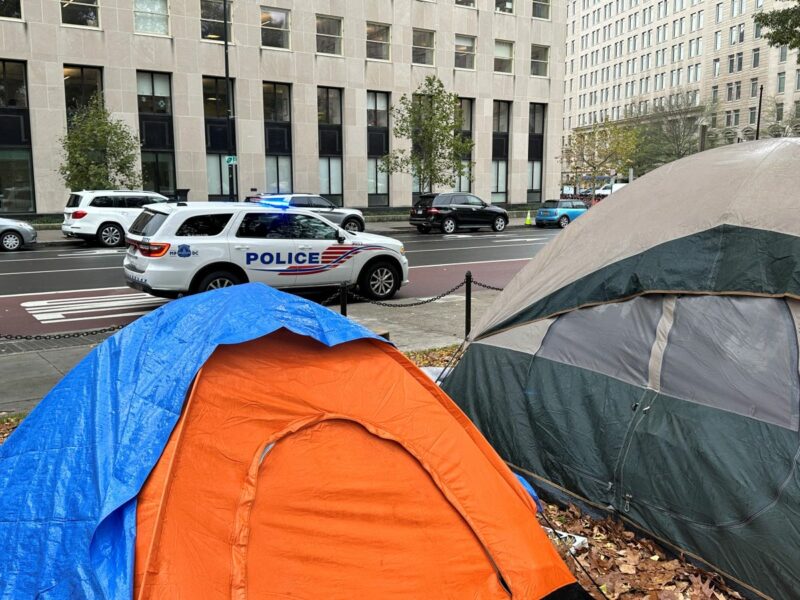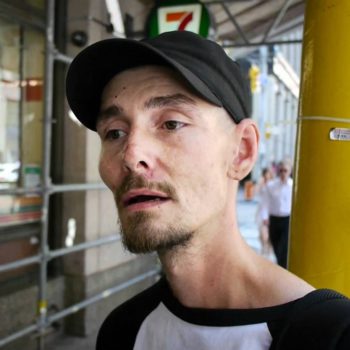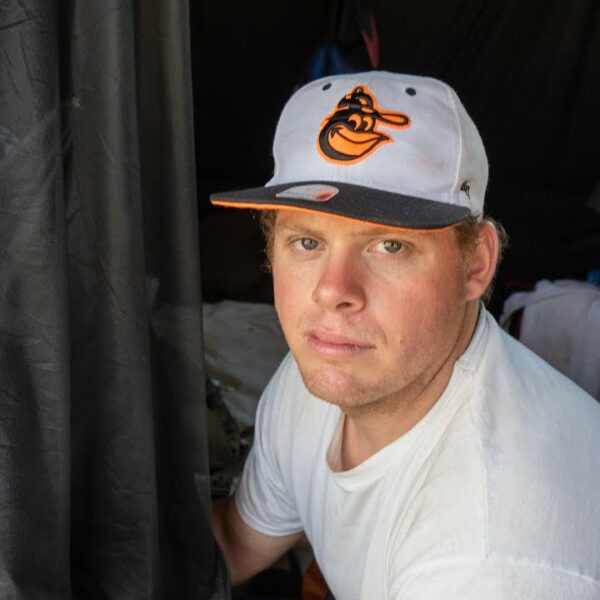Asleep on the top bunk of a homeless youth shelter in Portland, Oregon, I woke gasping for air. I couldn’t move. Flailing, I tried to throw off the sheets, binding me down in the darkness.
A figure loomed above me. Someone was holding me down, not something. Panicked, confused, and disoriented, I thought I was dreaming.
I kicked hard between their legs. They buckled in pain. My foot firmly planted on their torso, I sent them flying off the bunk bed. They fell with a thud. I held my breath, hoping the shelter staff hadn’t heard the noise. I didn’t want to get in trouble for fighting. My rapist crawled to their bed on the other side of the room.
I stared at her bed until morning, ready to pounce down if she tried to rape anyone else.
I didn’t return to the youth shelter the next night. I was going to sleep outside where it was safer –– where I had more control of my surroundings. I worried that she would rape others with her dildo if I wasn’t there. But I couldn’t risk getting attacked again in my sleep.
Next month, the Supreme Court will hear the Grants Pass v. Johnson case that, if upheld, would have punished me for sleeping outside after I was raped in that youth shelter in Oregon.
This law is just one in a long line of attempts to formally criminalize homelessness in the US over the last two decades. A similar “sit-lie” law in Portland, Oregon, when I was homeless, was struck down as unconstitutional in 2009. Another similar law in Boise was also struck down after that.
Attempts to criminalize poverty come before the court regularly, like an epidemic of aporophobia. But it feels different this time—more precarious. We are on the verge of a recession in an ongoing pandemic in an election year, and because Roe has fallen, it feels like everything else might fall, too, with this court.
The case centers around a law passed in Grants Pass, Oregon, a city that wants to be allowed to fine, jail, and punish people for sleeping outside regardless of whether there are safe shelter options –– even though imprisoning people is proven to be more expensive than housing people.
Studies from McKinsey & Company found that housing people is cheaper than jailing or forcing them to remain homeless through fines. The cost to incarcerate one person annually, according to the Vera Institute, is $47,057 –– far more than a $12,000 studio apartment would cost to rent for the year.
Some people argue that this “Housing First” approach doesn’t work because it won’t address underlying issues of mental health or substance use. But therapy and seeing an addictions counselor won’t do much good if your most basic needs are not met first.
Permanent Supportive Housing programs take this into account while giving people a safe place to recover from the trauma of homelessness while also addressing other more complex needs.
I spent roughly half my childhood homeless all over the West Coast, fleeing my trafficker. I was homeless as a teenager near Grants Pass, Oregon, where the case is centered. I was trafficked again as a teenager by traffickers who groomed me in another homeless youth shelter in Oregon.
I once tried to calculate how much money taxpayers spent on keeping me alive as a homeless child. It amounted to at least half a million dollars –– a figure far higher than the annual rent for a studio apartment. Our austerity policies around homelessness, fining, and jailing people for sleeping outside, none of these things actually save taxpayer money. But this is not about money. This is not about responsible government fiscal spending. This is about abject hatred for poor people.
Fines for homelessness put people with no money into more debt, ruining their credit and chances of renting an apartment. Arresting unhoused neighbors slaps them with more fines, in addition to a criminal record that can make housing and employment opportunities impossible.
Punishing people for homelessness will likely kill them or shorten their lifespan. Still, it won’t stop more new people from becoming homeless due to eviction, poverty, our housing shortage, or other circumstances. An unhoused person’s risk of death is 60% higher than someone who is housed, and studies have found that the stress and trauma of homelessness ages people 20 years on average.
Phoenix, Arizona, the first city where I was homeless as a kid after escaping my trafficker who nearly killed me, filed an amicus brief in support of Grants Pass. The City of Phoenix petitioned the Supreme Court to allow them to arrest homeless people, even though that’s been proven to be more expensive than housing. It seems that every city I was ever homeless in as a child wants to criminalize what I barely survived.
Musical chairs is a good analogy for the housing crisis. When you play musical chairs with ten people but only nine chairs, inevitably, the elderly woman with a cane is going to be left without a place to sit unless someone helps her to a chair. Housing works exactly the same way.
At least 22% of homeless people have a disability, 6% are veterans, and 1 in 4 homeless people are over the age of 55. The elderly homeless population in America is expected to triple by 2030.
We need to protect housing as a human right. We need to increase funding for HUD and change HUD’s exclusionary policies so that the burden does not fall on one generous city, state, or county.
The National Alliance to End Homelessness found that prioritizing housing people saved municipalities at least $15,773 annually for every individual unhoused person and that a housing first model costs $23,000 less per person per year than a shelter program like where I was raped in my sleep as a teenager.
This decision impacts all of us. Because with enough strokes of bad luck, you too could be homeless –– if you get sick, if your family dies, if a surgery goes wrong, if someone stalks you, if the stock market crashes, if you lose your job, get divorced, if you get hacked or your identity is stolen, or if you’re in a car accident. There are a million paths that can lead to homelessness, and very few to get out.
SCOTUS’s decision on Grants Pass v. Johnson will decide whether cities can fine and jail people who have a pillow or blanket. This could mean that police will arrest Black families having a picnic on a blanket in a park, and students may be fined or jailed for lying in the grass on their college campus to study with a hoodie tucked under their head as a pillow.
The law does not clearly define what a blanket or pillow is. This is just one example of how SCOTUS’s decision will have far-reaching consequences that we can’t predict.
I agree that the housing crisis and homelessness are upsetting. But punishing individual people for society’s failures won’t make the problem go away. Even health insurance companies like United Health have found that housing people in their own apartments is cheaper than allowing the status quo state of homelessness to continue.
Housing for everyone isn’t an impossible fantasy — plenty of other countries have this infrastructure.
The need for affordable housing is growing exponentially. According to the World Inequality Database and housing costs, economic disparity in the US today rivals the Great Depression and Dickens’ era of Oliver Twist. The average American uses wealth for financial security, but “for the rich, wealth begets power.”
Providing housing for all on a national scale is a proven and effective solution that will make our cities more beautiful and safe for everyone. It will cost less and likely raise home values.
Although a national Housing First model will require significant upfront investment, the ROI will be a happier, healthier population. I say national because it isn’t tenable for a handful of cities to bear the economic weight of homelessness for the entire country. Nor should we ask vulnerable people to uproot their lives and leave their jobs for housing in a cheaper region where they have no community support.
Urging federal agencies like HUD to invest nationally in housing is far less expensive than our current homelessness policies. For example, the cost of arresting homeless people and jailing them is significantly higher than an apartment.
As we enter a new recession, we must ask ourselves if we want to continue wasting money on punishing the most vulnerable people. At what point will we admit that the criminalization of poverty simply doesn’t work and wastes taxpayer money?
If the Supreme Court chooses to uphold the Constitution in Grants Pass v. Johnson, the decision will protect all Americans from cruel and unusual punishment. Forget about the pursuit of happiness — this SCOTUS decision will rule whether you and I have the right simply to survive in this country.
This article was originally published at Sabra Boyd: A Workaholic in Progress.













